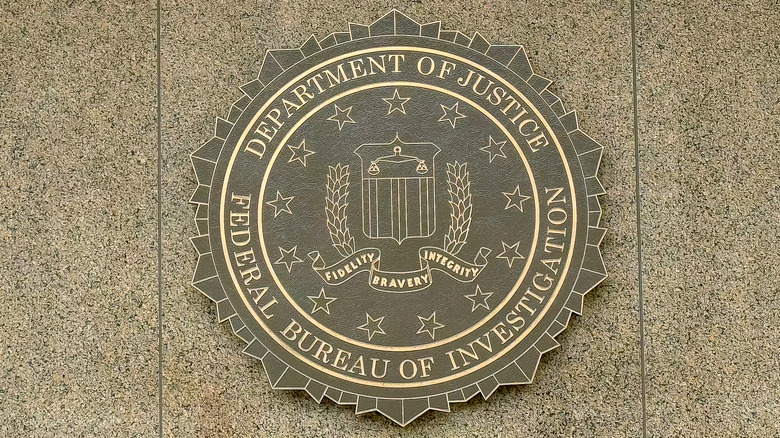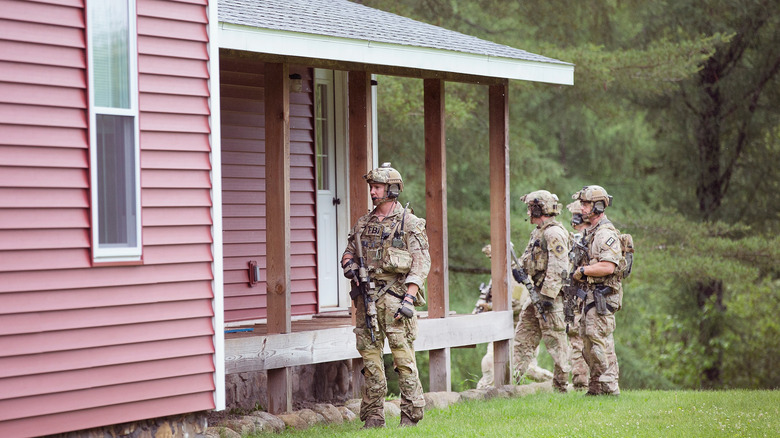What's The Difference Between An FBI-Executed Search Warrant And A Raid?
On August 8, 2022, the FBI searched former President Donald Trump's residence at Mar-a-Lago, reports PBS. According to Newsweek, agents removed several boxes from Trump's residence. This move is a part of a more extensive investigation into Trump and the possible mishandling of classified information. Soon after, accusations called the search a politicized and partisan attack on the former president. The truth is that federal search warrants require a labor-intensive process. Obtaining a search warrant involves a checklist of requirements agencies must meet before a judge approves the request, says Associated Press, via U.S. News and World Report.
Furthermore, since the Mar-a-Lago search involved a former president, top officials in the Justice Department most likely had to sign off on the request. "This couldn't have been just a knee jerk 'let's go serve a warrant' situation," said former FBI agent Dennis LormeI. "I would want to make sure that I have an as airtight or as bulletproof of an affidavit as I could have" (via Associated Press). In other words, search warrants — particularly high-profile ones — are difficult to obtain and require specific evidence before being granted.
Search warrants are typically a last resort after all other means of accessing important information are exhausted. The Justice Manual states that agencies use search warrants when "it appears that the use of a subpoena, summons, request, or other less intrusive alternative means of obtaining the materials would substantially jeopardize the availability or usefulness of the materials sought" (per The New York Times).
How do federal search warrants work?
According to The New York Times, a search warrant doesn't signal that a person is guilty. Instead, search warrants are used to obtain critical evidence and information possibly located on a person's property, including from electronic devices. Warrants are used in time-sensitive situations when federal agents need to act quickly. For example, agencies may be concerned about information, documents, or materials getting moved, hidden, or destroyed.
In the case of Donald Trump, federal agencies may have reason to worry about evidence destruction. New York Times journalist Maggie Haberman released photos allegedly showing evidence of Trump's attempts to flush notes and other papers down toilets during his tenure in the White House (via Yahoo! News). A person with a history of disposing of important information would give federal agents the urgency that a search warrant requires.
To receive a search warrant, federal agencies need to present their evidence and make their case to the magistrate or judge, demonstrating the need for the warrant, explains Associated Press. Those requesting the warrant need to prove "probable cause," which means they need to prove there's enough evidence of illegal activities to justify the search, says The New York Times. Regarding the search of Mar-a-Lago, journalist and historian Garrett M. Graff, author of "Watergate, A New History," told Newsweek that it is "hard to even imagine how high the bar of probable cause must've been for the Bureau to initiate such a politically sensitive search."
How are raids different?
Agencies also need to provide "particularity" in their request. This requirement means agencies must set parameters for their search to avoid abuses, writes The New York Times. Particularity, ideally, ensures that the search works within the narrow bounds of the case and does not impinge on the person's life or property outside of the criminal investigation. The application process for a search warrant is secret, so the person in question doesn't hide or conceal evidence.
Getting a search warrant is even more labor-intensive when investigating a president, explains PBS. In 2020, Trump's attorney general Bill Barr added that federal agencies must get permission from the attorney general to receive a search warrant for a presidential candidate. This new law means that current attorney general, Merrick Garland, must have also signed off on searching Trump's residence.
A federal raid differs from a search. The Center for Criminal Justice's Task Force on Policing writes that raids involve forced entry. Typically, raids use SWAT teams, are focused on the element of surprise, and are performed late at night or early in the morning. These searches usually require extreme conditions and fears that the parties in question may damage evidence or harm officers. Under this definition, the investigation at Mar-a-Lago was a search rather than a raid.


